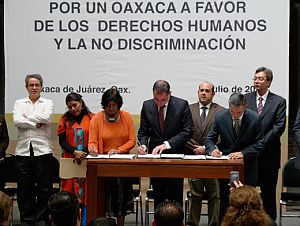Geneva, Switzerland - The United Nations recognized Mexico’s progress in protecting human rights and its work to fight discrimination in the country. "A qualitative and quantum leap had been achieved in the legal framework of Mexico, an important contribution to promoting human rights in the country," said Pastor Elias Murilo Martinez, UN Country Rapporteur for the Report on Mexico.
The UN Committee on the Elimination of Racial Discrimination (CERD) met on Wednesday in Geneva to assess Mexico’s progress in terms of implementing the provisions set out in the Convention on the Elimination of Racial Discrimination.
Alejandro Negrin Muñoz, the Director General of Human Rights and Democracy at the UN Ministry of Foreign Affairs, said "Mexico was characterized by a complex culture and wide geographic dispersion," and that these conditions created challenges for the Mexican federal government to implement change, but major progress has been made.
In June 2011, Mexico passed a series of reforms to protect human rights, including the incorporation of provisions in the UN Convention on the Elimination of Racial Discrimination into the Mexican Constitution. Since the reforms, Mexico has created the National Council to Prevent Discrimination and the National Institute for Women.
Negrin Muñoz noted that federal spending on indigenous communities increased by 149 percent from 2006 to 2011 – from $27 billion pesos to $68 billion pesos.
Ricardo Bucio Mujica, the president of the Mexican National Council for the Prevention of Discrimination, represented the Mexican delegation of the CERD during the meeting. "A real revolution has taken place in the areas of human rights and tackling impunity," he said.
Bucio Mujica noted that under the Constitution, all courts in the country are obliged to uphold the UN Convention. Citizens can file an "amparo" and demand that the provisions in the UN Convention be upheld. An "amparo" is a Mexican constitutional legal process that protects the citizen and his basic rights, and protects the constitution itself by ensuring that its principles are not violated by statutes or actions of the state that undermine the basic rights enshrined therein.
One of the topics on the CERD’s agenda was the situation of the indigenous Yaqui people, who reside in the state of Sonora. The CERD questioned the treatment of the Yaqui people and whether their rights to land have been violated.
Bucio Mujica responded by saying that the Yaqui people had a conflict with a Canadian mining company because the Yaqui dug a well near the company’s operations but negotiations are in progress.


